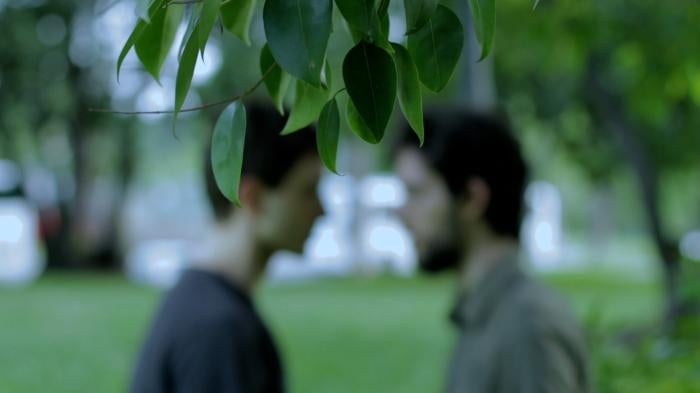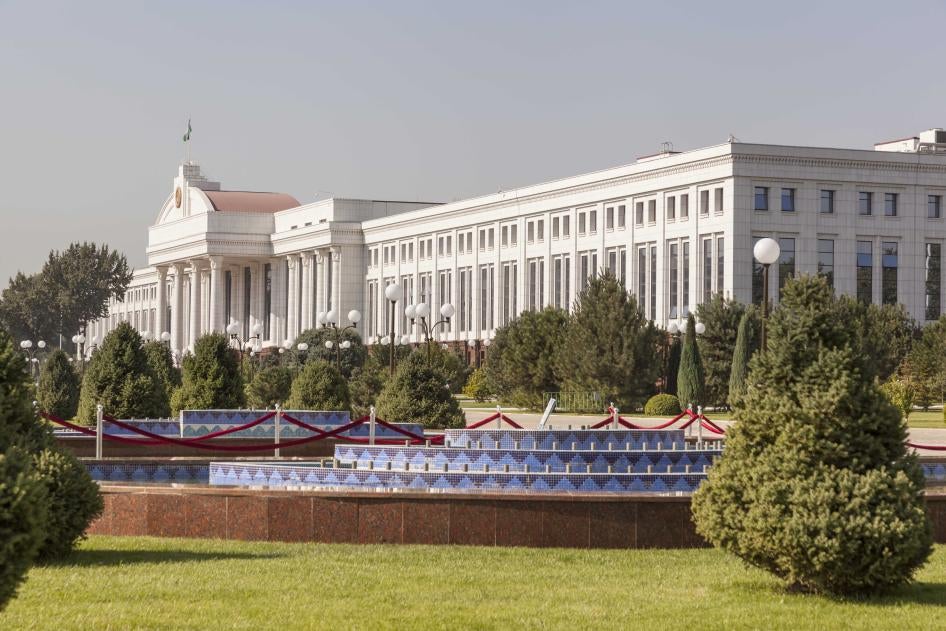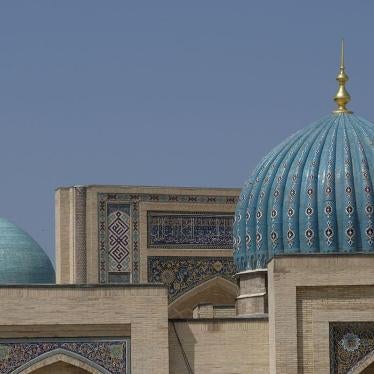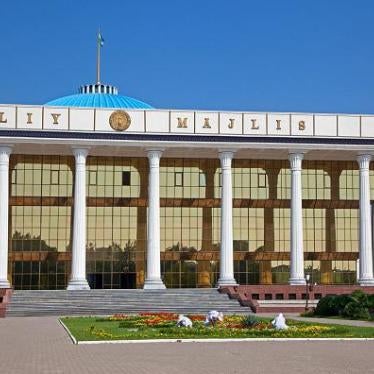(Berlin) – Men in Uzbekistan who engage in consensual same-sex sexual conduct face arbitrary detention, prosecution, and imprisonment as well as homophobia, threats, and extortion, Human Rights Watch said today. Uzbekistan should guarantee rights to personal security, privacy, and nondiscrimination by decriminalizing consensual sexual conduct between men.
Uzbekistan, a current member of the United Nations (UN) Human Rights Council, has undertaken key human rights reforms since President Shavkat Mirziyoyev came to power in 2016, but the criminalization of same-sex sexual conduct remains a significant stain on Tashkent’s record. Article 120 of the current criminal code punishes consensual sexual conduct between men with up to three years in prison.
“Article 120, and abuses linked to it, has placed gay and bisexual men in Uzbekistan in a deeply vulnerable and marginalized position, leaving them with almost no protection from harassment by police and others,” said Hugh Williamson, director of the Europe and Central Asia division at Human Rights Watch. “Uzbekistan should definitively turn a page from its abusive past and remove this rights-violating and outdated provision from its new Criminal Code.”
Human Rights Watch interviewed nine gay men and lesbian, gay, bisexual, and transgender (LGBT) activists and reviewed other material, such as videos depicting and encouraging humiliation, insults, beatings, or sexual abuse of gay men that were posted online and in homophobic social media groups, such as TashGangs. The men interviewed, who asked to remain anonymous, said that they faced arbitrary arrests, threats, extortion, psychological pressure, and physical attacks by both police and non-state actors for being gay.
Article 120 is a carry-over from Uzbekistan’s Soviet past and is problematic because it violates fundamental rights protected under international law, such as to privacy and bodily autonomy, and is blatantly discriminatory. Only two states in the former Soviet Union, Uzbekistan and Turkmenistan, still criminalize consensual same-sex conduct. Turkmenistan has said that it will reconsider its law. While it seems that prosecutions based on article 120 are rare, police in Uzbekistan continue to use it to arbitrarily detain and threaten people, who may ultimately be prosecuted on other charges, such as prostitution.
Uzbekistan is considering a new Criminal Code, yet the draft published on February 22, 2021, retains the offense, in a new article, 154, with the wording unchanged.
Gay men who face human rights abuses have few legal remedies. One activist said that LGBT crime survivors do not seek protection from police “fearing they will be outed, [or] subjected to bullying and insults by the authorities [themselves].”
In a February 2020 report, the Eurasian Coalition on Health, Rights, Gender and Sexual Diversity (ECOM), an alliance of nongovernmental organizations working on LGBT issues, citing local activists, documented that police in Uzbekistan harassed gay men, detaining and interrogating several of them between August 15 and September 15, 2019. After an Istanbul-based LGBT activist from Uzbekistan, Shohruh Salimov, issued a video appeal in August 2019 urging President Mirziyoyev to protect the lives of LGBT people in Uzbekistan, police visited his relatives’ home and told them they were looking for him to arrest him, media reported.
Media outlets in Uzbekistan also reported on the shocking case of Shokir Shavkatov, a 25-year-old man who was found stabbed to death in his apartment in September 2019, just days after he came out as gay on his Instagram page. Police opened an investigation, and later a man was convicted for Shavkatov’s “intentional murder.”
Five men also told Human Rights Watch that they had paid bribes of up to the equivalent of US$1,000 to keep them from disclosing the men’s sexual orientation to family members or the public. Two of them said they had to pay a bribe to the police.
“Because of the violence and discrimination that LGBT people are subjected to, we had to stop most of [our] projects, news feeds or groups online,” one activist said, describing the climate of fear’s chilling effect on activism. “We’ve gone completely underground.”
Uzbek law has no provision for hate crimes, nor can crimes be prosecuted as aggravated offenses if they are motivated by hatred based on discrimination. Uzbekistan has yet to adopt a comprehensive anti-discrimination law that includes sexual orientation and gender identity as a protected ground. As of September 2019, the last time it addressed the issue, the Uzbek government said there were no ongoing criminal investigations involving violence against LGBT people.
Multiple local and international human rights groups, as well as UN bodies, have called on Uzbekistan to decriminalize same sex conduct in recent years. The UN Human Rights Committee, which oversees state compliance with the International Covenant on Civil and Political Rights, three decades ago held that state laws prohibiting consensual same-sex conduct violate government obligations to respect the rights to privacy and nondiscrimination.
In July 2019, a group of LGBT activists sent a letter to President Mirziyoyev, urging him to repeal Article 120. They said that “this article opens a path to vigilantism and corruption.” In December 2020, nine international human rights organizations issued a statement calling on the Uzbek government to “stop punishing homosexuality and respect the human rights of all.” On March 5, after Uzbekistan’s draft Criminal Code was published retaining the offense, 44 human rights groups issued a joint statement urging Uzbekistan to decriminalize same sex conduct.
In its May 2020 conclusions, the UN Human Rights Committee called on the Uzbek government to repeal Article 120 and expressed concerns about “continuing reports of discrimination, harassment and violence, including extortion, arbitrary arrest, torture and sexual abuse, against lesbian, gay, bisexual and transgender persons by State officials and private individuals, including in places of deprivation of liberty, and about the mandatory disclosure of private medical information.” The committee noted a “high level of impunity for these crimes” and expressed concern that LGBT people are “unable to report violence and discrimination against them for fear of prosecution.”
Uzbek authorities have dismissed calls to decriminalize homosexuality. In March 2020, during the UN Human Rights Committee’s review of Uzbekistan, an Uzbek government representative said that the “lifestyle [of LGBT people] was not approved by Islam and was not in keeping with the Uzbek mindset.”
Uzbekistan should decriminalize same-sex sexual conduct by repealing article 120 of the criminal code and excluding any provisions criminalizing same-sex conduct from its new criminal code. The government should also investigate attacks and harassment based on sexual orientation and gender identity, including threats made by law enforcement officers to use article 120 against people, and hold those responsible to account. The authorities should adopt effective nondiscrimination policies, combat violence, harassment, and hatred against LGBT people, and facilitate the registration and operation of nongovernmental groups working on LGBT issues.
Uzbekistan’s international partners should press Uzbekistan to decriminalize same-sex conduct in keeping with its obligations to uphold key human rights standards. The European Union (EU), in negotiations with Uzbekistan over the EU’s GSP+ trade incentive, should set up a dedicated human rights monitoring process, including LGBT rights, involving domestic and international civil society groups.
“Criminalization of same-sex sexual conduct is fundamentally incompatible with international human rights norms and keeping it on the books contributes to an environment of fear and hostility for LGBT people in Uzbekistan,” Williamson said. “If Uzbekistan wants to show the world it is serious about respecting human rights, parliament should decriminalize consensual same-sex conduct before it adopts a new Criminal Code.”
For detailed findings on human rights abuses faced by gay men in Uzbekistan, please see below.
Human Rights Watch conducted a total of nine interviews with gay men from Uzbekistan and Central Asian LGBT activists in November 2020 and February 2021. The majority of interviews were conducted in person by Central Asian LGBT activists in collaboration with and under the guidance of a Human Rights Watch researcher in February. Interviews were conducted in Russian and Uzbek. Human Rights Watch used pseudonyms for all interviewees and withheld some identifying information to protect their privacy and security.
Arbitrary Arrests and Other Police Abuses
Muzaffar
In late 2019, the police detained Muzaffar, who is in his late teens, and his boyfriend after a park caretaker observed them kissing in a park in one of Uzbekistan’s bigger cities. The two men were taken to a police station for questioning.
At the station, the officer seized their phones and forced them to unlock the devices. “They searched our belongings and went through the phones without our consent,” Muzaffar said. “The police officer said that either we give them passcodes ‘the nice way’ or they will make it worse for us.”
Muzaffar said that the officer found photos and videos of the couple kissing in one of their phones and threatened them both with criminal prosecution under article 120. The police informed both Muzaffar’s and his boyfriend’s parents that they had been detained, and summoned them to the police station, outing them to their families. His boyfriend’s mother paid a bribe in return for their release, Muzaffar said.
Rashid
In summer 2020, Rashid, in his mid-20s, agreed to provide sexual services to a man who had contacted him online. When he arrived, three men attacked him and filmed the beating:
When I arrived at the apartment, the man told me to come in, go to the bedroom and undress and wait for him. After about 10 minutes, three men barged in. One of them was filming on his mobile phone. They started beating me on my head and body… They insulted me and said that I’m a prostitute, [that I] spread HIV… They also threatened me with article 120.
Rashid said that after the attack, the men continued to harass him, threatening to upload the video online, and report him to the authorities. After some time, the assailants took Rashid to the police station, where an officer forced him to confess that “he works as a prostitute for men.” The police also forced Rashid to take an HIV test.
The police officer told Rashid he had a choice. He could be an informant for the police or pay the equivalent of US$1,000 for their silence. The officer told Rashid that he had the video recording of Rashid’s confession, which the officer threatened he could upload, or use to charge Rashid for selling sex to men or for engaging in same sex conduct under article 120.
Rashid agreed to pay. Because of the officer’s threats and fears of being outed, Rashid did not seek legal assistance after the incident.
“Article 120 completely infringes on the rights and freedoms of LGBT minorities,” he said. “It’s scary to share your sexual orientation with anyone, also because someone could then use that information to blackmail you.”
Extortion by Members of the Public
Aziz and Farhod
In mid-2020, an acquaintance secretly filmed Aziz and Farhod, both about age 20, while they were kissing indoors. The acquaintance used the film to extort money from them, saying he would make their sexual orientation public on social media, out the men to their relatives and even file a police complaint unless they paid him US$500.
Aziz and Farhod said they had no choice but to pay. A month later, the man attempted to extort more money from them. This time they refused, cut off all communication with him, and blocked him on social media.
Aziz and Farhod said they did not report the incident to the police. Aziz said:
Article 120 violates the rights of a huge number of people. Fear of disclosure [of one’s sexual orientation], criminal prosecution, the constant beatings, calls for reprisals on social networks. It all constantly frightens representatives of the LGBT community in Uzbekistan. Vigilante justice is even more frightening. I think the government should repeal this article and introduce protection mechanisms for victims of violence on the grounds of sexual orientation and gender identity. Vigilantism should be punishable by law.
Alisher
In the summer of 2020, Alisher and a man he had been chatting with online agreed to meet. The man invited him to his apartment and Alisher agreed. After they entered the apartment building, the man grabbed Alisher’s mobile phone and punched him in the face. Another man joined the attack, hitting Alisher several times in the head. Both men then ran out of the building.
Alisher chased after them and demanded they return his phone, he said. But “the men threatened [me] with physical violence if [I] didn't stop calling for help – saying they will beat [me] up or even kill [me].” They promised they would give Alisher his phone if he paid them one million Uzbek sum (approximately US$100), threatening to take him to the police if he did not. The men claimed they were working for the police.
Worried that he would not get his phone back if the police got hold of it, Alisher agreed to pay. His phone contained all his contacts and access to his social media profiles. Before they left, the men forced Alisher to admit on video that he had chatted with a man online and is “a faggot.”
Alisher hired a lawyer and reported the attack to the police but did not mention the homophobic motive of the attack, fearing prosecution under article 120. The police opened a criminal case but did not take any meaningful steps to investigate the attack, Alisher said.
Timur
In the fall of 2020, Timur, in his mid-20s, began chatting with a man he met online in a gay dating group in Telegram. Their conversation included sexual topics and the possibility of meeting in person. Timur also shared naked pictures of himself with the man. Although their initial exchanges were friendly, after some time the man became threatening. Using obscene language, the man told Timur that “he hates ‘such people’ [gay men]” and that “Allah should exterminate all ‘such’ people.”
Timur described the harassment and threats he faced:
He continued threatening and putting psychological pressure on me by saying that he would disclose my [sexual] orientation to others, share our conversations with the police, and send my photos to homophobic online groups that publish personal data of LGBT people and call for retaliation against them.
The man also attempted to extort money from Timur, but Timur said that he “had no money and was not going to pay anything,” and blocked the man on social media. Two months later, however, Timur found a photo of himself in an online gay-dating group with a warning that he was “HIV-positive, blackmailing, and extorting money from people.” The post was removed after Timur contacted an administrator of the group.
He did not report what happened to the police, fearing that they would out him to his parents and community.
Timur explained that the criminalization of same sex relations “has a big negative impact on [our] health. The government should repeal article 120 to stop the intimidation and blackmailing, as well as criminal prosecutions, and ensure protection for LGBT people.”
Violence and Threats from Members of the Public
Umid
After Umid, in his late teens, was cornered by one of his roommates in late 2019, he admitted that he is gay. The roommate said he considered homosexuality a disease and that “such people [LGBT] needed to be [medically] treated.” He threatened to out Umid to his family unless Umid agreed to attend a mosque with him. Umid did, but after several days refused to continue.
In response, Umid’s roommates beat him up, and called Umid’s father, outing him, and saying that Umid “deserves to die.” Umid returned home after the attack, but his parents began pressuring him to get married. His family did not allow him to see a doctor after the beating.
After some time, Umid fled his parents’ home, but they continued to call him, threatening to report him to the police for being gay unless he agreed to get married. Umid said that he did not report the beating to police out of concerns for his family’s reputation, and for fear of prosecution under article 120.
“The police do not open criminal cases against attackers, and homophobes think that they have authority to punish gays,” said Umid.
Bekzod
Over the past few years, Bekzod, in his late 20s, has been involved in raising awareness about sexual orientation and gender identity, and has provided online support to other LGBT people in Uzbekistan. In response, Bekzod has faced online death threats, threats of physical violence, and other forms of harassment and intimidation, such as making his personal data public.
In mid-2020, an unidentified user sent Bekzod obscene and offensive messages saying, “We will destroy you… slaughter you like cattle. I have a big axe for you, which I will use to cut you apart.” Another message read, “I will take your life with my own hands, I'll give your bones to the dogs.” Bekzod said that his family and colleagues have also been the targets of online threats. For security reasons, Bekzod has had to stop his online activities:
My family members know about my sexual orientation and are tolerant… But I’ve convinced them not to go to the police. I’m afraid if they go and tell them all I’ve been experiencing, this could result only in more threats against me and people I know. I don’t think this is just a bunch of hooligans or homophobes, it looks like a gang that has carefully planned each and every step, targeting me.
Muzaffar
Muzaffar said that his tutorial videos on TikTok on how to apply makeup mean that he regularly contends with hateful comments and threats online. He said that under each video he receives bullying comments from “a radical part of the Uzbek society,” calling for reprisals against him in the name of religion.
Repealing article 120 of the penal code is one step toward equal treatment, Muzaffar said, but “attitudes towards LGBT people won’t change unless there is awareness raising and the media starts to cover these topics [e.g. the lives and stories of LGBT people].”










